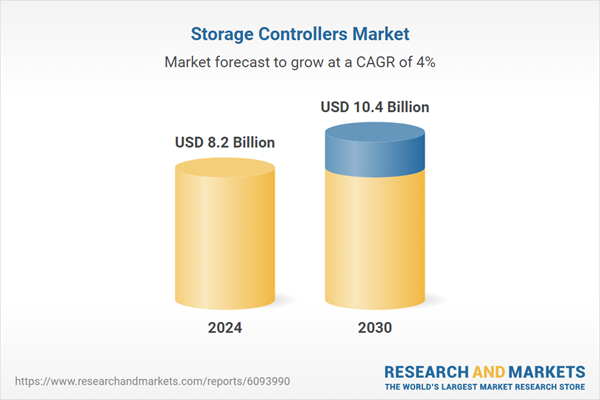Global “Storage Controllers” Market - Key Trends & Drivers Summarized
How Are Storage Controllers Powering the Next Wave of Data Infrastructure?
Storage controllers are foundational components of modern data storage architecture, enabling the management of read/write operations, data redundancy, and performance optimization across physical and virtual storage environments. As data generation accelerates exponentially across sectors - from financial services and healthcare to media and autonomous vehicles - the role of storage controllers in ensuring high-speed access, low-latency performance, and fault tolerance has become critical. These intelligent systems act as the 'brains' of storage arrays, coordinating data flow between host systems and storage drives, whether HDDs, SSDs, or NVMe devices. In enterprise IT, storage controllers are essential for managing complex RAID configurations, deduplication, compression, and encryption, supporting both performance and data integrity. The transition from on-premises infrastructure to hybrid and cloud-based environments has placed additional demands on controllers, necessitating advanced features such as tiering, caching, and replication across geographically dispersed data centers. Modern storage controllers are now integrated with machine learning algorithms that dynamically adjust workloads based on usage patterns, significantly enhancing system efficiency. As businesses continue to adopt AI/ML workloads, high-performance computing (HPC), and edge computing, the need for faster, more intelligent storage management systems continues to rise. With software-defined storage (SDS) architectures gaining traction, the line between hardware-based and software-based storage controllers is also blurring, creating new opportunities for flexibility, scalability, and cost optimization.Why Are Enterprises Upgrading to Next-Gen Storage Controllers?
The demand for next-generation storage controllers is being fueled by the need to handle increasingly complex and data-intensive workloads. With the rise of big data analytics, AI model training, virtual machines, and containerized applications, enterprises are seeking storage controllers that can process massive volumes of information with minimal bottlenecks. Enhanced throughput and IOPS (input/output operations per second) are no longer just desirable - they are mission-critical in industries like finance, telecom, and e-commerce where real-time data availability directly influences business outcomes. Many organizations are migrating to all-flash or hybrid storage arrays, where traditional controllers are often insufficient to manage the speed and responsiveness offered by SSDs and NVMe technologies. This shift has prompted manufacturers to innovate around multi-core controller processors, ultra-fast memory integration, and PCIe 4.0/5.0 interfaces that maximize bandwidth. Moreover, security is a growing concern, with enterprises opting for controllers that support advanced encryption, secure boot, and AI-driven anomaly detection to guard against cyber threats. Storage controllers are also playing a central role in enabling disaster recovery and business continuity, through features like synchronous replication and snapshots. In hyper-converged infrastructure (HCI) systems, integrated storage controllers help simplify deployments, reduce overhead, and accelerate scalability. As enterprises increasingly move to 'as-a-service' IT models, storage controllers that can support elastic capacity provisioning and workload-aware performance tuning are becoming essential components in modern data center architectures.How Is Consumer and SMB Demand Reshaping the Storage Controller Market?
Beyond large-scale enterprises, there's a surge in demand for robust and cost-effective storage controllers among small to medium-sized businesses (SMBs), prosumers, and even individual tech enthusiasts. As high-resolution content creation, remote work, and home labs become mainstream, these user groups are turning to network-attached storage (NAS) and direct-attached storage (DAS) solutions equipped with intelligent controllers to manage growing data volumes. Affordable storage controllers with features like RAID support, hot-swapping, and SSD caching are enabling small offices and home users to achieve enterprise-grade reliability and performance without the associated complexity or cost. This democratization of storage technology has been further driven by the growth of content-heavy platforms such as YouTube, gaming, and video production, where fast and secure data access is non-negotiable. Startups and remote teams are deploying private cloud and hybrid storage environments powered by controller-enabled NAS systems that offer better control over data, privacy, and scalability. Furthermore, many consumers now demand integration with mobile and IoT ecosystems, requiring storage controllers to support diverse access protocols, real-time backups, and cross-device synchronization. Simplified user interfaces, remote management apps, and automated firmware updates are key factors driving adoption among non-technical users. As data sovereignty and compliance standards become more relevant to even small businesses, there's growing interest in on-premise storage solutions that leverage smart controllers to maintain secure and compliant data repositories.The Growth in the Storage Controllers Market Is Driven by Several Factors…
The robust growth of the storage controllers market is driven by technological evolution, diversified end-user needs, and rapid digital transformation across industries. On the technology front, the rise of high-performance storage mediums such as NVMe SSDs and persistent memory has necessitated more advanced controllers capable of managing ultra-fast data transfer and complex storage logic. The proliferation of virtualized environments, containers, and cloud-native applications has increased the demand for storage controllers that are optimized for agility, scale, and real-time performance. In terms of end-uses, sectors like finance, healthcare, media, and manufacturing are deploying intelligent storage controllers to support AI workloads, regulatory compliance, and uninterrupted data access. The accelerating adoption of edge computing is also boosting demand for compact, high-efficiency storage controllers that can operate reliably in remote or resource-constrained environments. Consumer behavior is shifting toward self-hosted and decentralized storage architectures, driven by privacy concerns and the need for high-speed local storage solutions. The rise in remote work, content creation, and gaming has fueled the need for personal and prosumer-grade NAS systems equipped with intelligent controllers. Meanwhile, software-defined storage and hyper-converged infrastructure trends are pushing vendors to develop controller software that is hardware-agnostic, modular, and easier to deploy across hybrid ecosystems. Regulatory developments around data protection and uptime standards are also encouraging businesses to invest in robust, secure storage solutions with sophisticated controller functionalities. Combined with declining component costs and advancements in AI integration, these factors are creating a dynamic growth environment for storage controllers globally.Report Scope
The report analyzes the Storage Controllers market, presented in terms of market value (US$). The analysis covers the key segments and geographic regions outlined below:- Segments: Type (SATA Host Bus Adapter, Fiber Channel Host Bust Adapters, RAID Controller Cards, SAS Expander ICs); End-Use (Information & Technology, Telecom, Logistics, Education, Healthcare, Media & Entertainment, Other End-Uses).
- Geographic Regions/Countries: World; United States; Canada; Japan; China; Europe (France; Germany; Italy; United Kingdom; Spain; Russia; and Rest of Europe); Asia-Pacific (Australia; India; South Korea; and Rest of Asia-Pacific); Latin America (Argentina; Brazil; Mexico; and Rest of Latin America); Middle East (Iran; Israel; Saudi Arabia; United Arab Emirates; and Rest of Middle East); and Africa.
Key Insights:
- Market Growth: Understand the significant growth trajectory of the SATA Host Bus Adapter segment, which is expected to reach US$5.2 Billion by 2030 with a CAGR of a 4.7%. The Fiber Channel Host Bust Adapters segment is also set to grow at 2.5% CAGR over the analysis period.
- Regional Analysis: Gain insights into the U.S. market, valued at $2.2 Billion in 2024, and China, forecasted to grow at an impressive 7.4% CAGR to reach $2.1 Billion by 2030. Discover growth trends in other key regions, including Japan, Canada, Germany, and the Asia-Pacific.
Why You Should Buy This Report:
- Detailed Market Analysis: Access a thorough analysis of the Global Storage Controllers Market, covering all major geographic regions and market segments.
- Competitive Insights: Get an overview of the competitive landscape, including the market presence of major players across different geographies.
- Future Trends and Drivers: Understand the key trends and drivers shaping the future of the Global Storage Controllers Market.
- Actionable Insights: Benefit from actionable insights that can help you identify new revenue opportunities and make strategic business decisions.
Key Questions Answered:
- How is the Global Storage Controllers Market expected to evolve by 2030?
- What are the main drivers and restraints affecting the market?
- Which market segments will grow the most over the forecast period?
- How will market shares for different regions and segments change by 2030?
- Who are the leading players in the market, and what are their prospects?
Report Features:
- Comprehensive Market Data: Independent analysis of annual sales and market forecasts in US$ Million from 2024 to 2030.
- In-Depth Regional Analysis: Detailed insights into key markets, including the U.S., China, Japan, Canada, Europe, Asia-Pacific, Latin America, Middle East, and Africa.
- Company Profiles: Coverage of players such as Apex Wire Shelving, CAEM UK Ltd., CMP Metal, Constructor Group AS, Donracks and more.
- Complimentary Updates: Receive free report updates for one year to keep you informed of the latest market developments.
Some of the 36 companies featured in this Storage Controllers market report include:
- Broadcom Inc.
- Cisco Systems, Inc.
- Dell Technologies
- Fujitsu Limited
- Hewlett Packard Enterprise (HPE)
- Hitachi Vantara
- Huawei Technologies Co., Ltd.
- IBM Corporation
- Intel Corporation
- Lenovo Group Limited
- Marvell Technology Group Ltd.
- Micron Technology, Inc.
- NetApp, Inc.
- Oracle Corporation
- Phison Electronics Corporation
- Samsung Electronics Co., Ltd.
- Seagate Technology PLC
- Silicon Motion Technology Corporation
- SK Hynix Inc.
- Western Digital Corporation
This edition integrates the latest global trade and economic shifts into comprehensive market analysis. Key updates include:
- Tariff and Trade Impact: Insights into global tariff negotiations across 180+ countries, with analysis of supply chain turbulence, sourcing disruptions, and geographic realignment. Special focus on 2025 as a pivotal year for trade tensions, including updated perspectives on the Trump-era tariffs.
- Adjusted Forecasts and Analytics: Revised global and regional market forecasts through 2030, incorporating tariff effects, economic uncertainty, and structural changes in globalization. Includes historical analysis from 2015 to 2023.
- Strategic Market Dynamics: Evaluation of revised market prospects, regional outlooks, and key economic indicators such as population and urbanization trends.
- Innovation & Technology Trends: Latest developments in product and process innovation, emerging technologies, and key industry drivers shaping the competitive landscape.
- Competitive Intelligence: Updated global market share estimates for 2025, competitive positioning of major players (Strong/Active/Niche/Trivial), and refined focus on leading global brands and core players.
- Expert Insight & Commentary: Strategic analysis from economists, trade experts, and domain specialists to contextualize market shifts and identify emerging opportunities.
Table of Contents
Companies Mentioned (Partial List)
A selection of companies mentioned in this report includes, but is not limited to:
- Broadcom Inc.
- Cisco Systems, Inc.
- Dell Technologies
- Fujitsu Limited
- Hewlett Packard Enterprise (HPE)
- Hitachi Vantara
- Huawei Technologies Co., Ltd.
- IBM Corporation
- Intel Corporation
- Lenovo Group Limited
- Marvell Technology Group Ltd.
- Micron Technology, Inc.
- NetApp, Inc.
- Oracle Corporation
- Phison Electronics Corporation
- Samsung Electronics Co., Ltd.
- Seagate Technology PLC
- Silicon Motion Technology Corporation
- SK Hynix Inc.
- Western Digital Corporation
Table Information
| Report Attribute | Details |
|---|---|
| No. of Pages | 288 |
| Published | February 2026 |
| Forecast Period | 2024 - 2030 |
| Estimated Market Value ( USD | $ 8.2 Billion |
| Forecasted Market Value ( USD | $ 10.4 Billion |
| Compound Annual Growth Rate | 4.0% |
| Regions Covered | Global |









